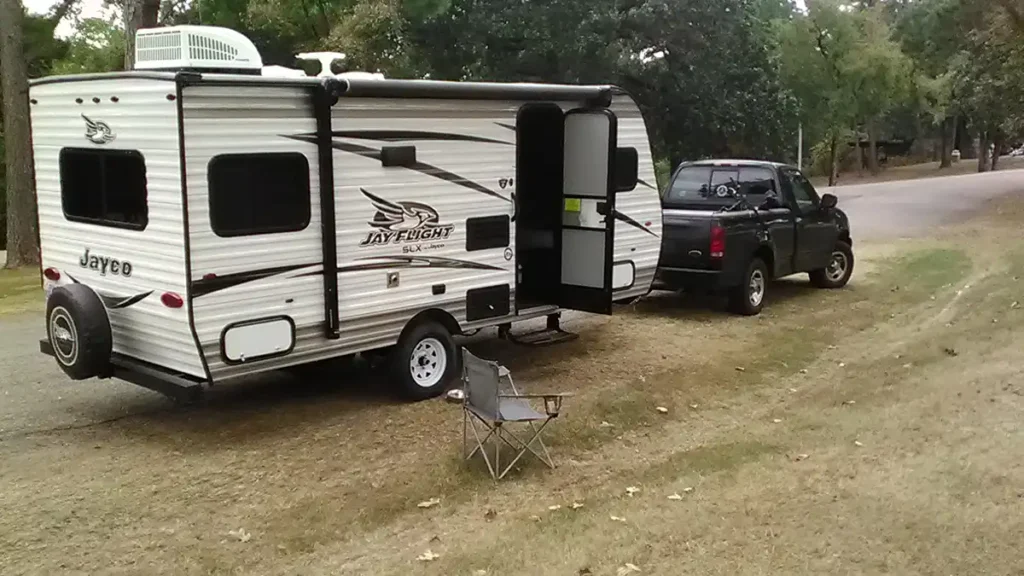The difference between “camping” and “overnight parking” is that camping involves a recreational purpose while overnight parking involves relieving driver fatigue. Camping can also include those who are sleeping on public property without a vehicle.

What is the Difference Between Camping and Overnight Parking?
States are using law enforcement officers to remove people from rest areas who are not actually “resting”. These is primarily RVers who do not appear to be sleeping. Rest areas are becoming overcrowded, and the people who actually need rest cannot find space at rest areas.
Hence, if you plan to sleep overnight at a rest area, you must make sure that you are acting like someone who needs a lot of sleep, instead of someone who appears to be having fun.
Many States Prohibit Camping in Rest Areas
Most states consider camping to be a form of recreation, and they don’t want rest areas to become overrun with partiers, loiterers, and those who don’t appear to need sleep.
If a law enforcement officer approaches your vehicle at a rest area and tells you that camping is prohibited, then your argument should be that you are not camping, but simply getting some badly needed sleep to continue driving. Sufficient rest is exactly what a rest area is for, and has a different purpose than camping.
- You should inform the officer that you stopped at this rest area because you became sleepy and are no longer able to drive safely.
- You must demonstrate this by remaining in your vehicle at all times (except to use the restroom), do not leave lights on inside your vehicle, do not watch television, do not play music, and act like someone who is too tired to do anything else.
- Let the officer know that you just need some more time to rest, and you’ll be on your way.
- Most officers are not going to force a sleepy driver to get back on the road.
Shade the Windows in Your Vehicle!
If law enforcement officers cannot tell that the lights are on inside your RV, van, or car, they will drive on by and leave you alone…
- It’s when they can see you walking around inside your RV, or sitting down with friends talking and laughing, that they might think you’re awake enough to keep driving.
How to Tell When Someone is Camping versus Overnight Parking
A law enforcement officer will know that you’re camping when it appears that you are not resting…
- Do not spend a lot of time outside your vehicle
- Do not turn on lights inside your vehicle (shade your windows so that officers cannot see light)
- Do not make loud noises (turn your TV way down)
- Do not leave your RV doors open
- Do not put out camping gear (chairs, tables, grills, dog fencing)
- Do not erect a tent on rest area lawn or grounds. A rooftop tent, or a tent in the bed of your pickup truck is usually okay
All Rest Areas Are Open 24 Hours a Day
Even though some states have actually prohibited overnight parking, their rest areas are still open 24 hours a day. You are well within your rights to arrive at a rest area at night, and stay for as long as the law allows.
- Many states that prohibit overnight parking at rest areas, will still allow someone to remain at a rest area from two to twelve hours at a time. Hence, it is still legal to arrive at night, and sleep in your vehicle for as much time the state provides.
- Read, “Which States Allow Overnight Parking at Rest Areas“.
Sleeping on the Ground or on Picnic Tables is a Huge No!
Sleeping at a rest area is only allowed when it’s done inside your vehicle. All states have supported the act of sleeping in your vehicle because they don’t want drowsy drivers on the highway. But, if you’re at a rest area without a vehicle, you should not be there!
- The quickest way to draw attention from law enforcement officers is to erect a tent on the lawn or grounds of a rest area.
- The next quickest way to draw attention is to sleep on the ground or a picnic table.
- The exception to erecting a tent is when the tent is part of your vehicle, such as a rooftop-tent, a pop-up tent trailer, or even a tent in the bed of your pickup truck.
Summary
Remember that it’s “rest versus recreation“, when it comes to the difference between overnight parking and camping. Rest areas are great places for overnight parking. Just keep a low profile, and don’t remain longer than you need to.

